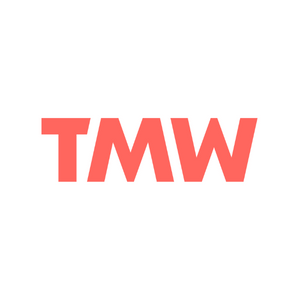
5 Minutes with… Graeme Noble

Graeme Noble’s career in advertising began when the publishing company he worked for allowed him to be a one-man agency, creating the ads for the media space they were selling himself. Ever since then he’s spent his whole agency life (barring a year or so at the agency that’s now Digitas) at TMW Unlimited. He began there as “just someone who could use a Mac” and now he’s chief creative officer.
LBB’s Alex Reeves caught up with Graeme.
LBB> How would you describe the sort of agency TMW Unlimited is?
Graeme> I’d love us to be known to have that real creativity of a classic ad agency, that ‘I love that idea, I got it straight away’ kind of feeling, but with the attitude of a smaller agency coming from the digital space. We can be more pragmatic but not at the expense of the idea.
How we get stuff done, how we make stuff, how we talk to people, how we are with each other. I think we’re quite a flat hierarchy. I mean, it’s fine for me to say that! I do have a team of CDs and all that, but we’re in an open plan office. I try and make sure we’ve got a 50/50 male female split in our teams. I think you want to create a meritocracy where the best ideas win regardless of who or what you are. Not having that baggage of being an old school ad agency is quite nice. We’re not weighed down by various philosophies. If people here like it then a lot of people out there are going to like it. It’s quite freeing, actually.
LBB> You can see that digital-meets-traditional style in campaigns like your ‘Adulting’ campaign for Kinder Bueno. What’s your approach to that sort of work?
Graeme> That started off as more of a digital and social campaign, but it’s got quite an advertising idea at its heart. We love doing that kind of stuff. We’ve won awards for Lynx - a thing called the AJ Drop with Anthony Joshua - and that is very much a digital engagement thing.
Sometimes it can drive you a bit nuts going: ‘Can we do this? Can we do that?’ The answer is that you’ve got to be quite adaptable these days. I think as long as you do everything well and don’t start going off into stuff which is naturally not your place to play in, that’s not really a problem. You can have your advertising hat on in the morning and your digital engagement hat on in the afternoon.
LBB> What were you like as a kid. Were there any clues back then about your creative future?
Graeme> Growing up, the only thing I was good at was art and drawing. I had no idea about advertising. My school was actually pretty shit. It got closed down. When I left school I was told I was going to be stacking shelves for the rest of my life. There was no plan as such.
I’m from a village outside Tunbridge Wells [in Kent], which is on the face of it as middle class as you can get. But it’s like anywhere. There are good parts and bad parts. My dad worked in a garage, you leave school, you don’t have any connections, you’ve got to get a job. I started landscaping.
Then I managed to get into doing a foundation course, which was very artsy. I did life drawing, which was fantastic. All of a sudden you go from ‘bollocks to the art world’ to loving life drawing.
LBB> How did you know a foundation course was a good idea?
Graeme> I fancied someone who I knew was going to go on the course! I did A-levels in graphic design and photography before. I always knew I was going to try and do something in that. But I didn’t know the ad industry existed.
The only creative jobs anyone ever mentioned that you could do were you could work for your local paper or you could be a wedding photographer. Kids don’t know that you can be an art director, you can be a writer, you could be a stylist, a food stylist, a set designer, a focus puller, a sound recordist or a storyboard artist. There are so many jobs that people don’t know about. But you don’t know what you don’t know.
It’s been a massive stroke of luck for me that I’ve ended up doing this. I still think, ‘how on earth did this happen?’
LBB> So what was the specific stroke of luck that led to you getting into the industry?
Graeme> I finished my foundation course and didn’t know what I was going to do. Then more out of lack of anything else to do I joined in with other people, went to Watford University - not the advertising course, one which involved a lot more life drawing, illustration. It was completely un-vocational. All of us left there with no practical knowledge whatsoever. We didn’t have a bloody clue!
Then, like most kids who can’t have a gap year, I left and started working in Argos because you’ve got to pay your mum and dad rent. I got a job at a local publishers, which was a good grounding actually. I was in their design department. I was soon the head of their design department (a head of two). That was a world where clients would phone up and ask us to do the ads. So you’d write the line and do the design.
So when I first got to London and there was a design studio, an art director, a writer, a creative director and client services I thought ‘wow!’
LBB> Because you used to do all of those jobs at once!
Graeme> Yeah, but I hasten to add, not to any standard! To a horrific standard. But it gave me a bit of a grounding. We take on grads from ad school and sometimes I think if you haven’t done a Christmas in Argos or a summer where you’re wondering what you’re going to do for the rest of your life, I don’t know whether it’s always such a good thing to come straight from ad school into doing ads. Maybe it’s just jealousy…
I actually started off at TMW before I left and came back again. It was quite a revelation. All of a sudden you’ve got this exciting agency world working until two in the morning on a pitch, but you don’t care because you’re all in it together having a laugh. It’s a completely different world. My then girlfriend or other people were saying: ‘You work until two in the morning and you don’t get paid overtime? Are you nuts?’ Once you get into the agency world that’s what you did. But we had a load of beers and it was fun. It just becomes what you do. It sounds really arrogant, but you can’t imagine doing a ‘normal job’ where it’s nine-to-five and once a year have Christmas drinks.
LBB> Looking back, what have been the most formative moments from then?
Graeme> TMW have always been quite good at being a meritocracy. I didn’t know what I was when I went in - I was just someone who could use a Mac. And then rather than being left alone and told to be in my place, which I think some agencies still do, the CDs said they thought I should be more on the conceptual side of stuff. So I moved.
I still kept my hands on a Mac, which is unusual. There was a time when you were either an art director or you were a designer. And I think people from my time started saying they do the big ideas but you can still make things work and move.
We won the Guinness digital account. I worked on that pitch. That meant we were given quite a lot of opportunities. In those days things were a lot freer. You weren’t so bound by PowerPoint as possibly some big corporations are now. Back in the day you could do ideas and the clients would look at them and go ‘that’s fucking funny’ or ‘that’s really good’ without referring to a 700-page checklist for the brand.
At the time it was just past the white horses and the ads with Rutger Hauer. I think nowadays there’d be somebody saying: ‘You don’t drink Guinness on the beach and as far as I know horses don’t enjoy Guinness! So our core audience won’t like this at all.’ It was completely illogical. But it struck a chord with everyone.
LBB> What lessons did you take from that?
Graeme> There’s so much focus on the logic of stuff that you’re in danger of not having an edge in a middle-of-the-road world. We’re in an age of X-factor and the three-second rule on Facebook, and everybody politely agreeing with each other on Twitter. If you’re not careful there’s a danger for most of us in the middle. We’re going to get to a stage where Ed Sheeran’s considered an edgy artist. I think if you can somehow have an edge with your creative, you’ll still cut through.
There’s a lot of talk about data and algorithms. You don’t have to worry about any of those as a creative. They’re just tools. You can have the most sophisticated data system in the world to make sure everyone sees your ad at the right time, but it still has to be an interesting bit of content.
We’ve been talking lately about being in this age where people have apparently got really short attention spans. Yet people go on three-hour Netflix binges. If you make your ads interesting enough then people don’t have a three-second attention span.
There’s more shit confusing everyone. There’s more stuff out there. So we get used to scrolling and scrolling. But people are buying vinyl again. People still love reading a book. Maybe it’s just what Facebook want us to think. But it’s an algorithm designed to get people buying media on those platforms and not necessarily that human nature has changed over the past 10 years.
LBB> What work have you been proud of recently?
Graeme> We did the Armistice Day project last year with the the big screens at Piccadilly Circus. It was the first time all of the screens had been used and we had sound as well. We had it for a whole hour. The fear of it going wrong… This is something that transcends any brand. The idea of a beach ball going round on a screen saying ‘Error, loading’ on a Friday night for something as important as that was quite real. We were confident but until it happened, it was a tense moment. If it didn’t work, there’s not much more of an iconic place for it to go wrong. But luckily it all went swimmingly.
The brief was not to celebrate but to commemorate. But if you take away the subject for a second, what was interesting is that if you’re using that big screen you’re catering for people who might be a little bit merry on a Friday night; they could be from Brazil or France or America; they’re just passing through Piccadilly Circus, so we had to think about the attention span. From five seconds, what if someone wanted to stay for a minute or two to show their respect, or what if someone wanted to stay for the whole hour? The reason we went with the idea that we did was because it was brutal simplicity. The impact of those screens turning red and keeping it quite graphic. We wanted it to be that even if you only stopped for three seconds you’d be moved by it. If you wanted to stay for five minutes you could get more from it.
It’s the first thing I’ve ever told my mum and dad that I’ve worked on after all the years working in this. I think you have to remember that what we do for a living isn’t an art project. You can have all the craft and care and you always get the passion of it, but it’s not personal when you’re doing it for a brand. We are naturally modest. I do this for a living but I’m not going to ask my friends if they saw that ad I did.
LBB> What else has been big for TMW recently?
Graeme> In 2017 the big pitch was being named the digital agency for Shell. They’re quite an ambitious lot and we recently won another pitch to launch a big loyalty thing for them across all channels. LNER started when Virgin lost half its franchise. We still do Virgin and we also do LNER, so we helped them launch a train brand in about six weeks. That was good fun.
Another thing we’ve done recently is we’ve really built up our own motion film capabilities - editing, grading, all that - in-house, which has made a huge difference to the agency. It’s a fun place to work in. It started with a couple of guys two years ago and now I think there 12 or 14 people.
We do everything from your obvious quick-turnaround content - an interview or something - filming something that is happening for content’s sake. We’ve also done TVCs in-house. I think if you’d said a couple of years ago we’d be able to shoot and grade our own TVCs, I’d say it’s a long way off. But we’ve done that a few times now, which shows how far we’ve come.
It gives you a lot more flexibility, internally and for clients. If you’re saying to a creative team you need an idea without loads of budget that still wants to be interesting, we can come up with film stuff knowing that the people that are going to do it are sitting on the desk behind you.
We did some stuff for Virgin Trains about their new on-board menu. It meant we could do some great little films. It was a bit breakneck but we organised it quickly, gathered a crew, edited in-house at a speed that you wouldn’t have dreamt of a few years ago. That means we can do better work. Clients like that.
You’ve got to get the balance between making sure that you’re personally happy with the quality but also offering flexibility. I think we’re really getting there. The bigger your in-house team, the better the talent you can hire, so we can bring in people now who used to work at that edit suite or that production company. Because we’re doing bigger stuff we can get that calibre of people in, which means our quality goes up.
LBB> And what are your big ambitions for the agency in the coming months and years?
Graeme> As a CCO, you’re always going to be judged on your work. You want to produce work that has an edge to it, so it makes people laugh or cry or think about it. You want to make sure that across the board you do more and more better and better work. Sometimes agencies like ours, maybe four or five years ago, would have one standout piece of work and there might not be loads of other stuff going on. You want to make sure that your standard of creative goes up across the board. You still have one or two marquee pieces. But even your most boring job now would have been considered an amazing job three years ago. Some of that is just getting in the right people. I can’t do it by myself, so you need to make sure you’ve got those people there to do it for you.













